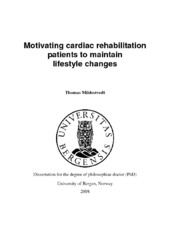Motivating cardiac rehabilitation patients to maintain lifestyle changes
Doctoral thesis
Permanent lenke
https://hdl.handle.net/1956/3438Utgivelsesdato
2008-12-05Metadata
Vis full innførselSamlinger
Sammendrag
Background: In Western societies, the single greatest opportunity to improve health and reduce premature death lies in personal behaviour. Personal behaviour is, however, embedded in social contexts. Therefore, we may question whether behavioural interventions are ethically justifiable. Those who are socioeconomically disadvantaged and people with emotional problems have a poorer prognosis for cardiovascular disease. Cardiac rehabilitation aims at improving lifestyle, but lifestyle changes are hard to achieve and even harder to maintain. Moreover, we want to develop interventions that do not leave some groups, and especially the disadvantaged, behind. Research is required to present and evaluate new and improved interventions. It is as important to describe why an intervention works (or does not work) as to present its efficacy. In this thesis, we wanted to present a newly developed intervention aimed at improving and maintaining lifestyle changes in a cardiac rehabilitation setting. We also wanted to explore whether lifestyle changes were harder to achieve among the socioeconomically disadvantaged and people with emotional problems. The intervention was based on elements from social cognitive theory and self-determination theory. Aims: The main aim was to evaluate whether the intervention was superior to standard cardiac rehabilitation. We also examined important predictors derived from our theoretical basis. In a separate analysis, we wanted to analyse the effect of providing personal choice. The first paper examines how socioeconomic factors, disease severity and risk status affect the ability of individuals to make dietary and exercise improvements after heart disease. We also wanted to evaluate whether unfavourable lifestyle outcomes among disadvantaged people were mediated by motivational problems. Methods: This is a randomised controlled trial and a longitudinal study of predictor variables in a four week heart rehabilitation setting with two years of follow-up. During a two-year period starting in August 2000, 217 patients were recruited and randomised to either intervention or standard, multifaceted cardiac rehabilitation. At 24 months, 41 patients were lost to follow up, leaving 176 patients eligible for two-year analysis. The intervention was based on a cognitive theory and autonomy support from self-determination theory. It aimed at helping the patient to prioritise between different lifestyle achievements during two individual counselling sessions. They also received a telephone follow-up at six and 24 months, focusing on their prioritised goals. Their level of exercise, smoking and present dietary habits were measured on inclusion and after six and 24 months. Different motivational factors and emotional distress were measured at baseline. Their predictive power was tested in the three dietary and exercise outcomes. Motivational factors were measured by task-specific self-efficacy questionnaires, General Expectancy and Treatment Self-Regulation Questionnaire. An Anxiety-Depression-Irritability questionnaire measured emotional status, while household income was chosen as the socioeconomic status predictor. Autonomy support was measured by the Health Care Climate Questionnaire. Results: We found no statistically significant between-group differences. Both groups showed an improvement in their dietary and exercise measures. Self-efficacy predicted an increased frequency of eating fish dinners, more daily units of fruit and vegetables and increased physical capacity. Autonomous motivation was significantly associated with a lower saturated fat diet, exercise and exercise intensity. General expectancy was a significant predictor of increased exercise and physical capacity. Controlled motivation hampered improvement in physical capacity. Autonomous self-regulation was lowest among smokers and female participants. Participants with high scores for emotional distress predicted lower motivation for all the measures. We found no association between socioeconomic status (household income) and the ability to achieve lifestyle changes. Current smoking status predicted lower ability to obtain lifestyle changes on all measures. Emotional distress was related to lower ability to increase physical activity at six months but not at 24-month follow-up. The mediating effects of motivational factors were insignificant. Conclusion: We found no effect of adding autonomy supportive, individual counselling to group-based interventions. Enhancing choice in a cardiac rehabilitation setting is not sufficient if the goal is to stimulate long-term lifestyle changes. Based on longitudinal documentation, this cardiac rehabilitation programme possibly improves long-term maintenance of dietary changes and exercise measures. Maintenance of these lifestyle achievements is related to autonomous motivation and self-efficacy. The results of this study do not support the suspicion that preventive efforts accentuate the socioeconomic differences in cardiovascular health. We need to target our rehabilitation efforts at special groups like smokers and the emotionally distressed.
Består av
Paper I: Scandinavian Journal of Public Health 35(2), Mildestvedt, T.; Meland, E., Examining the ‘Matthew Effect’ on the motivation and ability to make lifestyle changes in 217 heart rehabilitation patients, pp. 140-147. Copyright 2007 by Associations of Public Health in the Nordic Countries Region. Published by Sage Publications. Full text not available in BORA due to publisher restrictions. The published version is available at: http://dx.doi.org/10.1080/14034940600881930Paper II. Scandinavian Journal of Public Health 35, Mildestvedt, T.; Meland, E.; Eide, G. E., No difference in lifestyle changes by adding individual counselling to group-based rehabilitation RCT among coronary heart disease patients, pp. 591-598. Copyright 2007 by Associations of Public Health in the Nordic Countries Region. Published by Sage Publications. Full text not available in BORA due to publisher restrictions. The published version is available at: http://dx.doi.org/10.1080/14034940701349241
Paper III: Scandinavian Journal of Public Health 36(8), Mildestvedt, T.; Meland, E.; Eide, G. E., How important are individual counselling, expectancy beliefs and autonomy for the maintenance of exercise after cardiac rehabilitation?, pp 832- 840. Copyright 2008 by Associations of Public Health in the Nordic Countries Region. Published by Sage Publications. Full text not available in BORA due to publisher restrictions. The published version is available at: http://dx.doi.org/10.1177/1403494808090633
Paper IV: Mildestvedt, T.; Meland, E.; Folmo, S.; Eide, G. E.; Williams, G., (2008), Cognitive behaviour modification and autonomy support in heart rehabilitation - is personal choice beneficial? Draft. Submitted 2008. Full text not available in BORA.
